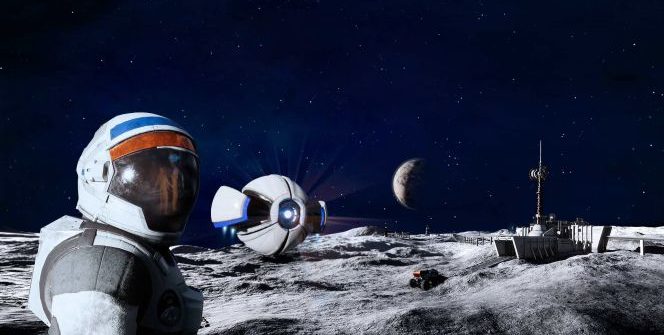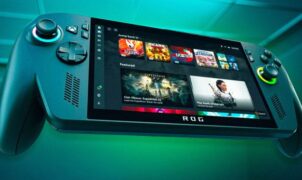The team has recently released Deliver Us The Moon on PlayStation 4 and Xbox One.
Koen Deetman, the founder of KeokeN and the director of Deliver Us The Moon, was interviewed by WCCFTech. He had to say this about the console release of their game: „We’ve had an amazing launch, especially taking into account the pandemic crisis that has gripped our world […] considering we’ve started this from the kitchen table with absolutely nothing.”
He seems to be highly interested in cloud gaming, and thus, a Google Stadia port: „Cloud Gaming is still starting and we’re honestly surprised how well the service works. It’s a new phenomenon that has yet to land with the general public. It’s like how we were all used to purchasing physical games in physical stores with physical money. That all changed when games started to become more and more available in a digital format, through online stores using digital money. Cloud gaming marks the start of a comparable change where games just become much more accessible and convenient to play. It removes the need for consumers to keep up with the latest hardware. In that sense, we feel cloud gaming is in line with a modern trend towards shared ownership, replacing traditional thoughts about what it means to ‘have’ something. So porting the game to Google Stadia would be interesting!”, Deetman said.
He can’t say anything about what they plan with the game’s universe and IP yet, but they have something happening in the background. He did explain what they wanted to keep in Deliver Us The Moon’s console port: „An important part of what makes Deliver Us The Moon a compelling astronaut experience derives from the game’s visuals. So we wanted that part of the game to remain intact, even though current-generation consoles are nearing the end of their cycle. Achieving this was probably the most complex aspect of porting the game. It became all the more challenging in our larger, more demanding levels, but we think we’ve struck a good balance between performance and graphics.”
What does he think of the PlayStation 5 and the Xbox Series X? „The computing power of the new consoles is very promising, and we’re very excited to see ray tracing come to consoles. For now, we don’t see too many differences, they seem to be competing well against each other and both are pushing new boundaries. Each console sporting an SSD will allow us to significantly shorten loading times, which is something we look forward to,” he replied. Could they port the game to them? „We don’t have plans for it, but plans can change! If we would do it, we think the new consoles can deliver a result similar to what high-end PCs achieve.”
He believes the devs can decide what frame rate and resolution they want: „Going to full 4K resolution gaming will probably mean that in many instances developers will fall back to stable 30 FPS targets. Using techniques like dynamic resolution and variable rate shading might be the best solution to this. Which might allow a stable 60 FPS without having to sacrifice asset fidelity.” He approves of the ray tracing: „We don’t know the exact ray tracing specifications yet. Early snippets of info do suggest similar performance to an RTX 2070 Super, which will be enough for similar results to what we have now on PC.”
KeokeN has won a Best Sound Design for an Indie Game category award with Deliver Us The Moon, and Deetman said they „put so much time and effort into making sure the game sounds right. Audio will always play a crucial role in our games and the next generation of consoles boasts a host of fantastic audio features. It looks like [the PlayStation 5’s] Tempest will free up CPU that we used to need for audio, so that leaves room for us to use for other aspects of the game. The HRTF functionality seems particularly interesting, too. We’re also excited about Project Acoustic’s wave-based technology. It’s all very promising and we’re looking into how it would tie into our existing workflow and technology.” What about the DualSense? „It’s another way of increasing immersion, so we’re looking forward to experimenting with it and finding out what it can mean for us and the games we make.”
He also talked about Microsoft‘s DirectX12 Ultimate and its new features: „If [the] Unreal Engine [5?] will implement them, we will undoubtedly use them. If not, we might look into what we can get from implementing it ourselves. Variable Rate Shading can give huge performance boosts without impacting fidelity too much, so that sounds most promising. Mesh Shading is a little more dependant on the content of the game, and so it means we might not see much benefit in comparison to regular mesh instancing. Sampler Feedback might allow higher resolution textures to be used, together with the quicker loading. The only downside is that we will still need to put those higher resolution textures on disk and disk space doesn’t seem to be increasing as fast as the disk speed.”
He doesn’t think that the PC games will require SSDs any time soon: „Requiring SSDs is something we don’t think will happen yet, as even on consoles external drives will probably still be supported. The games’ experience might be a lot less smooth though, and highly recommending an SSD will probably become common. SSDs definitely improve the gaming experience and we’re very glad consoles finally have them. It will allow developers to assume the most common hardware setups now have an SSD and implement techniques that make use of associated speeds.”
So KeokeN is hopeful.
Source: WCCFTech
Please support our page theGeek.games on Patreon, so we can continue to write you the latest gaming, movie and tech news and reviews as an independent magazine.
Become a Patron!



![[TGA 2025] Star Wars: Galactic Racer Focuses on High-Stakes Podrace Runs [VIDEO]](https://thegeek.games/wp-content/uploads/2025/12/theGeek-Star-Wars-Galactic-Racer-302x180.jpg)








![[TGA 2025] Star Wars: Galactic Racer Focuses on High-Stakes Podrace Runs [VIDEO]](https://thegeek.games/wp-content/uploads/2025/12/theGeek-Star-Wars-Galactic-Racer-300x365.jpg)



Leave a Reply